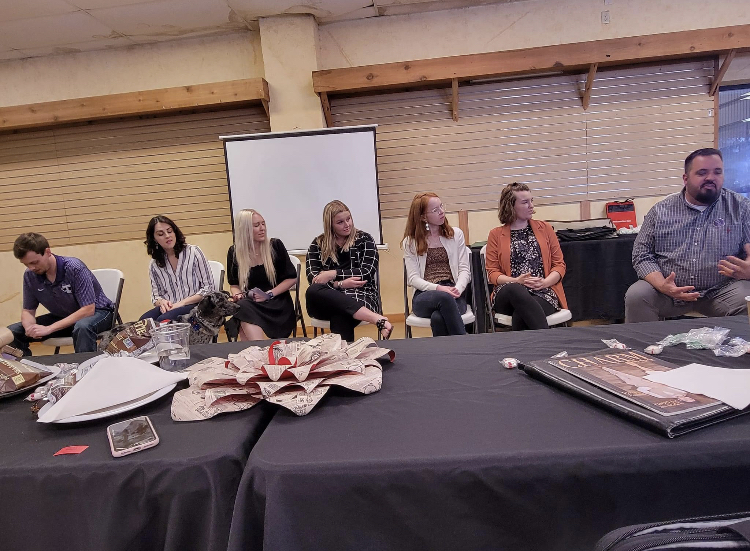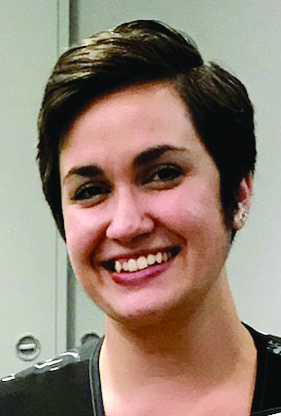By Abigail Allen/TCCJ Contributor
The future of Texas journalism sat in front of representatives from North and West Texas community newspapers Friday in Hamilton to discuss how to engage young people.
Six Tarleton State University students accompanied Austin Lewter, the director of the Texas Center for Community Journalism as well as a Tarleton instructor and the Texan News Service coordinator, to share their thoughts on how to reach them and their peers at the second-annual combined convention of the North and East Texas Press Association and the West Texas Press Association.
“Wyndi [Veigel] called and said, ‘Hey, would you come talk for about 45 minutes about how to engage younger people?’ and I said, ‘It would be a lot easier if I just brought you some younger people to talk to,’” Lewter said.
Those younger people were TNS Editor-in-Chief Elizabeth Guarjardo, Managing Editor Sierra Wells, Senior Producer Nicholas Ratcliff, Associate Producer Kyley Wilhite and graphic designer Taite Read as well as TCCJ’s student intern Christa Wilson.
The Texan News Service staff produces more than just a print product, Lewter said, also churning out television and video news, audio news and online news.
“These students who come out of our program come out with audio chops, with video chops, digital chops,” Lewter said. “And, by the time I’m done with them, hopefully they’ll know how to write a good story, too.”
The subjects the students tackled ranged from how they get their news and what their peers are interested in consuming, to what they’re looking for in employment and why they’re pursuing journalism.
All of them access their news online, whether through their social media feeds, Google News for the Android users or Apple News for the iPhone users, or through email.
“Social media brings it to me,” Guarjardo said.
Ratcliff is a self-proclaimed over-reader who accesses the media bias chart weekly and reads articles on the same topic from varied sources to combat issues of media bias.
He encouraged the editors, publishers and other journalists in the room to demonstrate to people his age that they are a trustworthy source of news.
Lewter also suggested that decisionmakers at local papers prioritize hiring “digital native positions”—for both editorial and advertising, when possible—to reach those online eyes.
When the discussion shifted to what publishers can do to entice young adults to work for them, the students had a few suggestions.
Those including promising a salary increase so the young journalists know they won’t be stuck at entry-level pay forever, providing a flexible work environment, and fostering an engaging and supportive newsroom.
Drawing on a practice hospitals in the Tyler and Longview area are using, Jim Bardwell, the Texas Press Association president and publisher of the Gladewater Mirror, Lindale News and Times, and the White Oak Independent, asked whether offering to help employees repay their student loans would attract them.
Wilson said that would help give her peace of mind as she leaves school and has to start making those payments.
Barbara Brannon, who is the editor and associate publisher of The Texas Spur, who also works with The Caprock Courier and the Floyd County Hesperian Beacon, brought up the “creative fringe benefit” of providing housing as a way to attract young reporters.
The students also talked about the responses they’ve had, either from peers or professors, to their work.
Wells talked about getting the most response on something that had a big impact on the culture of the school—a piece called “Purple Poo suspended for hazing” that discussed the spirit organization being suspended in March of 2021.
The responses can be harsh at times, Ratcliff said, with people sometimes asking how he and the TNS staff can be so critical of Tarleton.
“I love [the school] enough to do this,” he said.
Lange Svehlak, publisher of the Athens Daily Review, expressed his appreciation for the students and their willingness to be put on the spot for the roundtable.
“You give me hope, not just for the journalism industry, but also for your generation,” Svehlak said.
To see the work the Texan News Service staff creates, visit texannews.net.
Abigail Allen is the Managing Editor of the The Pilot Point Post-Signal.

